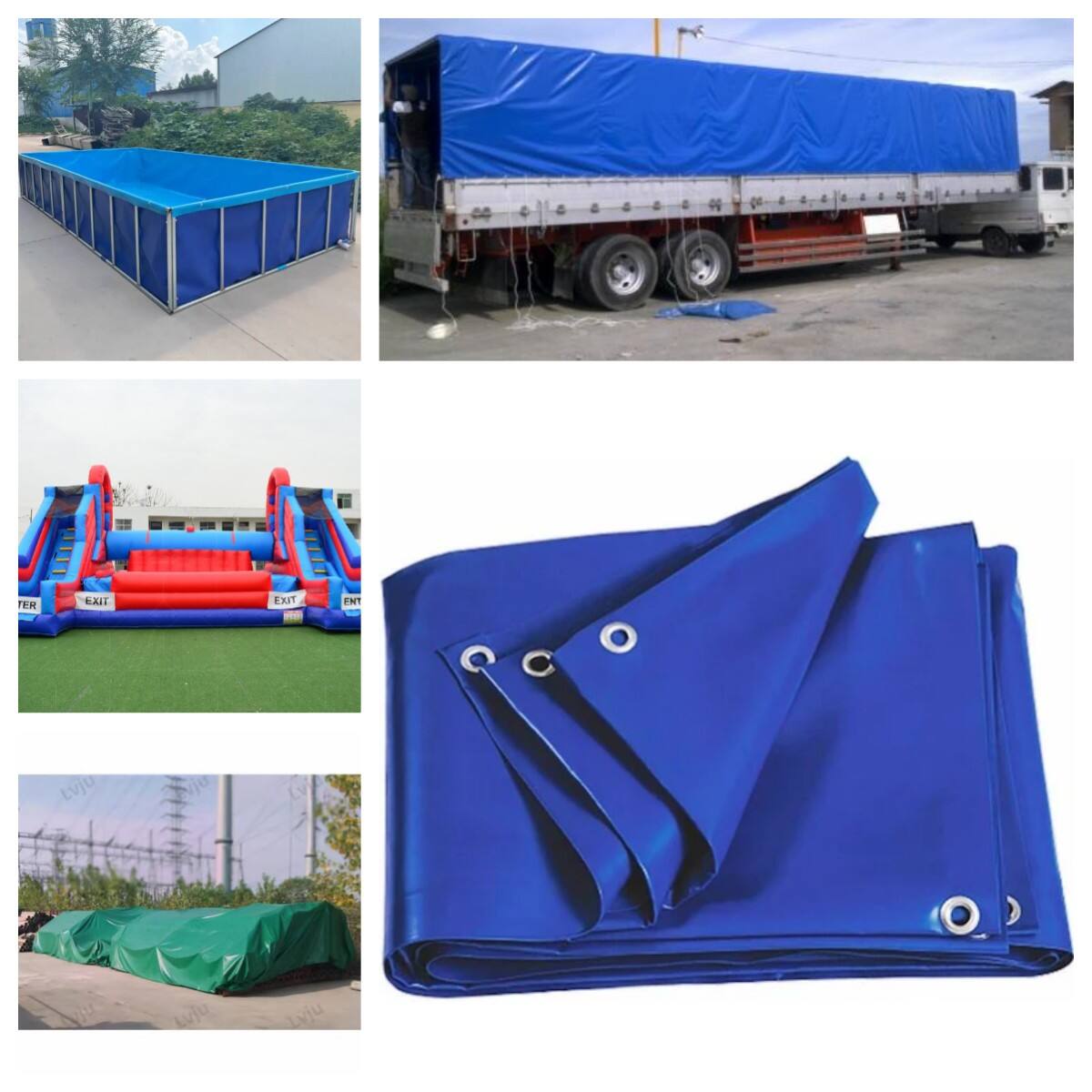Understanding PVC Tarpaulin Durability and Construction
Material Composition and Fiberglass Reinforcement
PVC tarps stand out because they last so long, thanks to what goes into making them. At the heart of these tarps is polyvinyl chloride, commonly known as PVC. Manufacturers usually pair this with polyester canvas as their base material. Once that's set, they apply a layer of PVC paste resin mixed with all sorts of helpful stuff including anti-mold treatments and static control additives. These additions help protect against things like UV damage and physical wear over time. For really tough jobs, some manufacturers throw in fiberglass reinforcement. This makes a huge difference in how strong and long lasting the final product becomes. The fiberglass mesh adds stiffness and stops the tarp from sagging or stretching when put under pressure. That's why we see these reinforced versions working hard on construction sites and farms where regular tarps would fail quickly. Industry guidelines actually specify exactly what materials should be used, so everyone knows their tarps will perform safely and reliably. All these elements together create those durable PVC tarps people depend on day after day across countless industries.
Tear and Abrasion Resistance
PVC tarpaulins are built to resist tearing and abrasion pretty well, which makes them work so much better in tough environments compared to regular tarps. Manufacturers actually put these fabrics through all sorts of tests before they hit the market. They check things like how strong the material is when pulled apart and whether it can handle sharp objects poking into it without giving way. Look at what happens on construction sites where heavy machinery constantly bumps into coverings. PVC holds up way better there than most alternatives do. Some research shows PVC can stand up to tearing forces around 30% stronger than competing materials according to tests published in the Journal of Applied Polymer Science back in 2021. People who know a lot about industrial materials keep pointing out that PVC just lasts longer overall. Construction crews, outdoor storage facilities, and even agricultural operations tend to go with PVC because it doesn't break down as quickly when exposed to sun, rain, or rough handling.
Longevity in Harsh Conditions
PVC has some pretty impressive characteristics that help it last through tough conditions for years on end. It stands up well against both freezing temps and blistering heat, which means it works reliably across different weather zones. Construction workers and farmers regularly talk about how tough their PVC tarps stay even after being exposed to rough elements day after day. Take farming operations for instance many growers use these tarps to protect trucks and machinery from sun damage and rainwater without worrying about them breaking down quickly. Want to make sure your PVC tarp lasts longer? A simple routine helps quite a bit just give it a good wipe down with soapy water occasionally and keep it away from anything sharp that might puncture the surface. This kind of care makes all the difference in maintaining protection while getting maximum value out of the material.
Weather-Resistant Features for All Seasons
UV Radiation and Waterproof Protection
Most PVC tarps come with UV protection built right in, something that really matters when they're exposed to constant sunlight. Manufacturers usually coat them with special treatments that either soak up or bounce back those harmful UV rays, helping keep the material strong and intact. If left unprotected, these tarps tend to break down over time, getting brittle and eventually tearing apart. And speaking of protection, PVC tarps also stand up well against water thanks to their waterproof construction. Rain just rolls off them instead of soaking through, which makes all the difference in places where storms roll in regularly. Tests show that tarps with good UV treatment often stick around for multiple extra years compared to regular ones, meaning better value for money in the long run.
Wind, Snow, and Fire Retardant Qualities
PVC tarps stand up well against harsh weather thanks to certain properties that make them effective when facing strong winds and heavy snow. The material itself is pretty tough and doesn't tear easily even during extreme conditions. Many manufacturers also treat these tarps with special chemicals to make them resistant to catching fire, which cuts down on potential damage from flames. Fireproof versions go through strict tests according to recognized safety guidelines, so people working in dangerous areas can trust they're getting quality protection. Construction crews and event organizers find this combination of strength and fire resistance really valuable for their operations since accidents happen all too often at job sites and festivals.
Performance in Extreme Temperatures
PVC tarps really hold up when things get super hot or freezing cold outside. They stay flexible without cracking or breaking down, no matter what kind of weather comes their way. Lab tests show these tarps keep their shape pretty well too, not expanding or shrinking much even when temps swing wildly day to day. People who actually live in places where summer melts asphalt and winter turns roads to ice have been raving about how durable these tarps are for years now. The folks making them know what works best after all those desert dust storms and polar blizzards. Their designs include special coatings and additives that fight against heat damage and frost bite, so users don't have to worry about their tarps failing during critical moments out in harsh environments.
Versatile Industrial and Commercial Applications
Construction Sites and Fiberglass Mesh Integration
Construction crews rely heavily on PVC tarps because they last longer and offer better protection than most alternatives. These tarps can stand up to rain, wind, and even snow without letting projects fall behind schedule. What really makes them work well though is pairing them with fiberglass mesh. When builders attach this mesh underneath the tarp, it adds serious reinforcement that stops tears from spreading across the fabric. We've seen this setup prevent accidents at several job sites where heavy materials were stored outdoors. Safety rules from organizations like OSHA require certain protections on construction sites anyway, so using these reinforced covers isn't just smart practice, it's pretty much mandatory for any decent sized operation.
Agricultural Use and Outdoor Storage Solutions
PVC tarpaulin has become really important for protecting things in farming operations. Farmers cover their expensive machines with these tarps to shield them against rain, snow, and sun damage, which means those tractors and harvesters last much longer than they would otherwise. When storing equipment outside, the thick waterproof material keeps everything dry inside while still allowing air circulation around the gear. Some research indicates that when farmers start using quality PVC tarps regularly, not only do their tools stay in better condition over time but they actually see improvements in what comes out of the fields too. This makes sense because protecting investments leads to better results across the board for most agricultural businesses.
Emergency Shelters and Fire Blanket Alternatives
PVC tarps are really versatile stuff, which makes them absolutely essential during emergencies when folks need temporary shelter after natural disasters hit hard. These tarps hold up against all sorts of weather conditions and keep people dry even when regular buildings aren't available. What many don't realize is how well they work as substitutes for fire blankets too. Some tests show these tarps perform just as good as standard fire blankets, and occasionally better at smothering flames. Fire departments across the country have started including PVC tarpaulins in their emergency gear because of this dual purpose. The material resists catching fire itself while still offering solid protection, so it's become pretty much standard equipment for responders dealing with unpredictable situations on site.
Maintaining PVC Tarpaulin for Long-Term Use
Cleaning and Storage Best Practices
If we want our PVC tarps to last for years instead of just months, then cleaning and storing them right matters a lot. A simple routine works best most of the time. Grab some gentle soap, maybe dishwashing liquid diluted in water, and give it a good scrub with a soft bristle brush. This gets rid of all that dirt and grime without harming the plastic surface. After washing, make sure to rinse everything off thoroughly and let the tarp dry completely before putting it away somewhere. Folding tends to create permanent creases over time, so rolling it up makes more sense for storage purposes. Find a spot that stays cool and dry, definitely not near any direct sun or heat source. Some folks swear by applying UV protection sprays every now and then too. These products supposedly keep the colors looking better and maintain flexibility longer, though results might vary depending on how much exposure the tarp actually gets.
Repairing Minor Tears and Damage
Taking care of those little rips in PVC tarps right away makes them last much longer. Most folks find that basic stuff like repair tape, specialty PVC kits, or just heating the edges works great for fixing minor holes. When someone grabs one of those repair kits, they should really take the time to clean off whatever got damaged first. Dirt and moisture just mess with how well the patch sticks. Want to know if something needs fixing or just tossing? Look at how big the hole is and where it sits on the tarp. A tiny spot near the edge might be fixable, but anything bigger than a quarter somewhere central probably means buying new. Anyone unsure about what to do would do well to check out actual repair manuals from manufacturers or talk to people who work with these materials daily. Their hands-on experience often reveals tricks that aren't in any written guidebook.
Maximizing Lifespan Through Proper Care
PVC tarps last much longer when given proper care and handled with some common sense. Checking them regularly for signs of wear and fixing small problems right away stops little issues from becoming big headaches down the road. The way they're used matters too nobody wants to drag a tarp over rough ground or let it rub against sharp edges that will eventually cut through the material. Industry experience shows time and again that people who take care of their tarps end up spending less money on replacements because they simply don't need new ones as often. Following basic maintenance practices ensures these tarps perform well and hold up under normal conditions for years rather than months.

